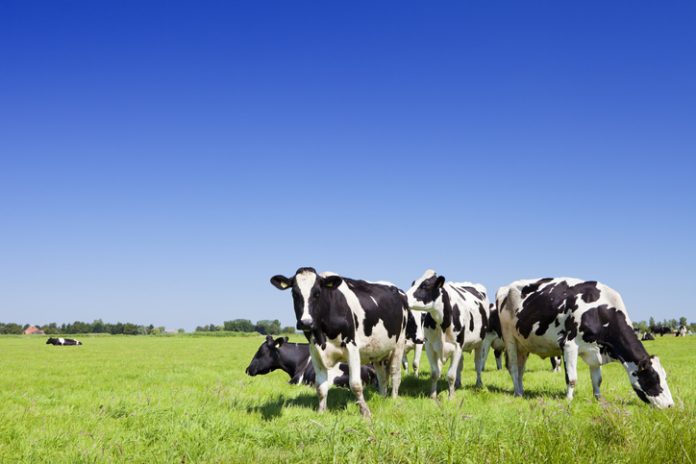By Andrew Weiss
As Europeans generate greenhouse gas emissions by driving or flying off on their long summer holidays, Denmark is trying to lower those emissions by taxing cow burps and flatulence to combat climate change.
The Danish government believes that taxing methane produced by animals will improve the lives of citizens by lowering global temperatures. Therefore, beginning in 2030, livestock farmers will be taxed $17 per ton of carbon dioxide-equivalent emitted by their livestock. That tax will increase to $43 by 2035.
The average cow emits the CO2 equivalent of about three tons per year in methane, so each cow will cost farmers $50 in 2030, reaching about $125 by 2035.
Other livestock such as sheep and pigs are also subject to the methane tax, but they emit less methane because of differences in the chemistry of their digestive systems.
But two professors—William A. van Wijngaarden of York University in Canada and William Happer of Princeton University—argue that restrictions on methane emissions are “not justified by facts.”
CO2 currently makes up about 420 ppm (parts per million), which is 0.042% of the atmosphere. Methane is a much lower 1.9 ppm, or about 0.0002% of the atmosphere.
Methane is increasing in the atmosphere at a rate of about 0.0076 ppm per year, while CO2 is increasing at a rate 300 times faster, or 2.3 ppm a year.
The methane molecule is about 30 times better at trapping heat than the carbon dioxide molecule. Therefore, methane contributes about one-tenth the warming of CO2.
Effect on the Economy
Denmark’s new animal tax will raise food prices. Prices for beef and milk will go up, percolating throughout the nation’s economy. Denmark’s economy contracted 1.8% last quarter and the inflation rate is 2.1%, but expect to see inflation increase with the new animal tax. The tax will disproportionately affect middle-income earners and the poor.
At the same time, farmers will see smaller profit margins. Some farmers will reduce their numbers of cows and shift to other animals or grain. Others might sell their farms and change occupations.
In America, the majority of beef farms are run by small operations. According to the U.S. Department of Agriculture, 54% of farms with beef cattle had fewer than 20 cows. On such a farm, raising a cow costs about $900 per year.
A U.S. methane tax identical to Denmark’s would be the same as an additional 15% tax on cattle. This would be devastating to small ranchers who are already pinched by increased overhead costs.
The Danish policy taxes carbon at $43 per ton. This so-called social cost of carbon is priced even higher here in America, and is an easily manipulated price tag that the government puts on carbon emissions.
Last fall, the U.S. Environmental Protection Agency proposed $190 per ton as the social cost of carbon to make its policies seem worth the regulatory burden. If taxed at this price level, a 20-cow operation would owe Uncle Sam an additional $11,000 per year.
Effect on Carbon Emissions
All 1.5 million cows in Denmark account for about 0.1% of the European Union’s annual 3.6 billion tons of greenhouse emissions.
The chart below compares greenhouse gas emissions by Danish cattle to emissions in all of Denmark and in the entire European Union.
When it comes to the atmospheric concentration of carbon dioxide, CO2 emitted in Denmark is no different than CO2 emitted anywhere else in the world.
If Danish lawmakers are concerned about CO2-caused climate change, the cost of the tax policy needs to be weighed against the global effect on emissions.
In 2022, India emitted 189 million metric tons more than it did in 2021. This is more than four times the entire carbon footprint of Denmark. The chart below shows India’s growth in carbon emissions wiping out the reduction in emissions provided by eliminating all Danish cattle.
Effect on Global Climate
Economics aside, this policy will have no effect on global temperatures. Even if the entire European Union halted all emissions (including livestock) the global temperatures would be reduced by only 0.12 degrees Celsius by the year 2100, assuming the highest climate sensitivity to carbon.
These numbers are calculated using The Heritage Foundation’s climate calculator, which uses a government climate model. (You can use the calculator for yourself here.)
From Denmark to California
Although such policies may seem unlikely to take hold in freedom-loving America, similarly intrusive regulations already have been implemented across multiple sectors. These regulations affect everything in the U.S. from large-scale power plants and the automotive industry to everyday household items such as gas stoves, water heaters, and lawn equipment.
In some states, including New York and California, building codes now prohibit gas hookups in many new construction projects, denying residents the right to decide for themselves what energy sources to use.
As of Jan. 1, it became illegal to buy gas-powered lawn equipment such as lawnmowers, leaf blowers, or chainsaws in California. This law will cost landscaping businesses over $1 billion and raise the price of landscaping services, causing some to lose their jobs and business closures.
It is time to stop perpetuating the fairy tale that taxing cow burps will reduce global temperatures. Such regulations only increase food costs and inflation in general, making poverty even worse.
Andrew Weiss is a research assistant for domestic policy at The Heritage Foundation.
Originally published by The Daily Signal. Republished with permission.
To read more about the attack on agriculture, click here.
To read more about net zero and food prices, click here.


























